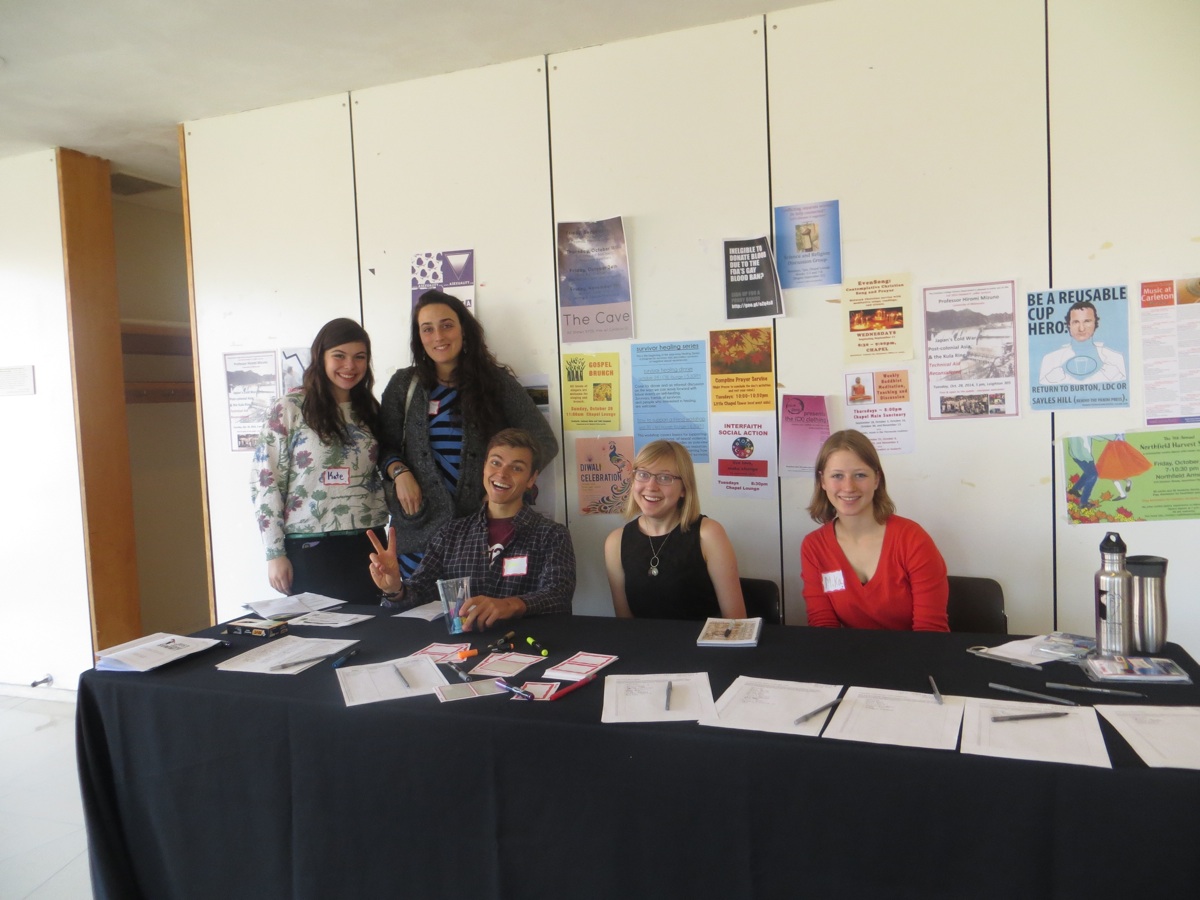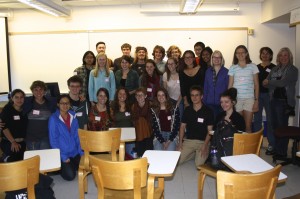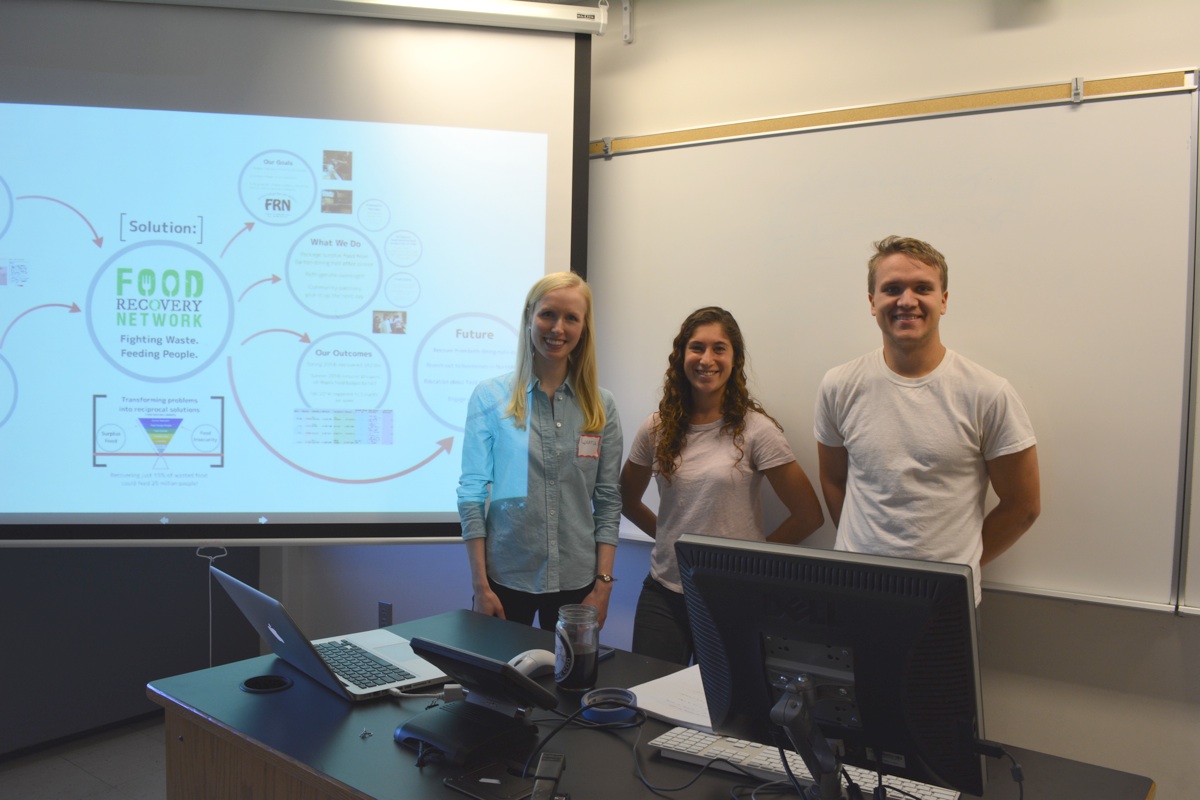Just Food Summit at Carleton College Unites Student Food Initiatives

Just Food Summit student organizers assist with event registration.
Skeptics doubting that the good food movement is alive and well in the United States need only to look at college campuses for beacons of hope. From campus farms knee-deep in sustainable food production, to Real Food Challenge chapters guiding their university’s purchasing dollars to support local, humane, ecological, and fair food systems, to the Food Recovery Network chapters addressing the paradox of food waste and hunger in our communities, food-centric organizations are proliferating at a rate perhaps only surpassed by a cappella singing groups.
However, along with the growth of any broad-based movement, it’s not unusual for subgroups to develop with their own particular focus. When groups splinter off into their own silos that don’t communicate, the cause’s overall progress suffers. Wanting to fight this tendency, students from Carleton College, St. Olaf College, and Macalester College came together at the Just Food Summit specifically to ensure that they were working toward synergy rather than segregation — both on their own campuses and between campuses.

The Just Food Summit student-led workshop “Why Worry About Waste?” drew a large group interested in reducing campus and community waste streams.
The half-day event was organized by many partners, including the Carleton Center for Civic and Community Engagement, Bon Appétit chefs and managers at Carleton College, Carleton’s FoodTruth student group, the Bon Appétit teams and students at St. Olaf and Macalester, and Bon Appétit’s Midwest Fellow (me). More than 70 students, staff, community members, and farmers came together to hear guest speakers, participate in workshops, and enjoy dinner and lots of discussion. The goal was threefold: deepen their understanding of food justice, share information and best practices across groups, and develop student leadership in the movement.
Environmental anthropologist Constanza Ocampo-Raeder set the stage for the Summit’s student-led workshops with her opening talk: “Eating Our Way to a Just World: Challenges and Opportunities in Contemporary Food Initiatives.” She challenged the audience to recognize its “blind spots” when it comes to participating in the food movement and its core messages. Drawing on her experiences as a first-generation Mexican American, Constanza explained how her membership in a local community-supported agriculture (CSA) program regularly conflicted with her ability to feed her family comforting, culturally appropriate foods. The weekly baskets filled to the brim with foreign flavors such as turnips and mild peppers represented a headache for her, not health. In this case, she argued, a narrow focus on local-foods promotion could inadvertently work against the development of an enduring, inclusive food movement.

Laura Arneson, Shira Kaufman, and Noah Anderson, Program Directors of the Carleton Food Recovery Network chapter, shared what they’ve learned from recovering food for a year at Carleton.
With Constanza’s words in mind, the participants chose between a range of student-led workshops such as “Why Worry About Waste?,” a discussion about campus waste streams and education by the Carleton Waste Monitors (visit their informative and entertaining blog, the Carleton Trash Mongers), and the Campus Farm Roundtable discussion involving leaders of St. Olaf’s STOGROW Farm and the Carleton College Farm. One of the most talked about breakout sessions, “Problem + Problem=Solution: The Food Recovery Network and Beyond,” by the Carleton Food Recovery Network chapter inspired students from the other colleges to either start or get involved in food recovery efforts on their campus.
By the end of the first Just Food Summit, dozens of students had approached me to share how influential it was to connect with other students engaged in the food movement. One St. Olaf student summarized the sentiment well when she said, “I normally walk around the dining hall thinking I can’t make a difference. Now I feel so empowered.” That was music to all the organizers’ ears. We were happy to provide a platform for our guests to join together and work toward a sustainable food system.